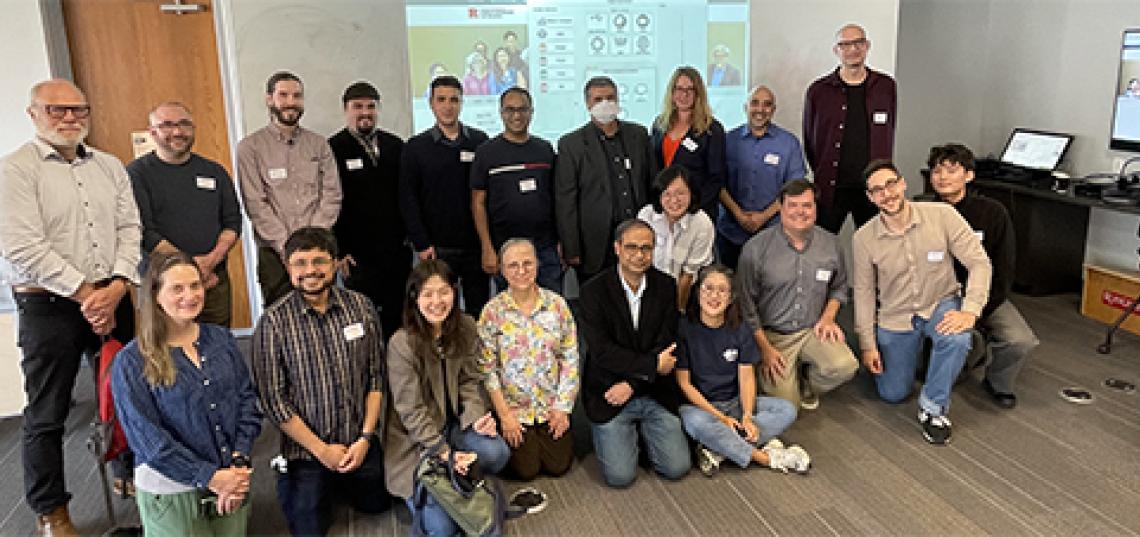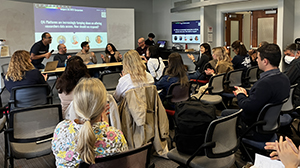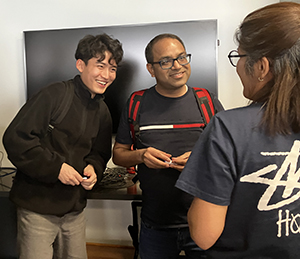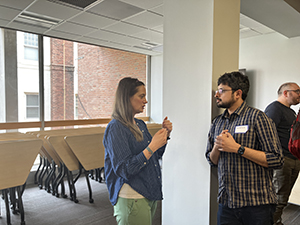
Recognizing the growing need to create space for meaningful conversations around the complex sociotechnical challenges facing the field of Library and Information Science, the SC&I Library and Information Science Department hosted the symposium, “Examining Critical Sociotechnical Challenges in Information Science” on April 4, 2025 at SC&I.
The aim of the symposium was to bring together, in person and online, scholars and practitioners from across the U.S. to discuss the pressing ethical, methodological, and epistemological challenges that define contemporary information research, and to foster cross-institution and interdisciplinary collaborations that can inform future research, teaching, and practice within LIS, SC&I, and beyond.
The event was organized by the SC&I LIS Research Development Committee, LIS Assistant Professors Tawfiq Ammari, Jessica Cheng, Alex Lu, and Shagun Jhaver.
"This year's symposium was fantastic in its breadth of topical coverage,” said Chair of the Library and Information Science Department and Associate Professor Rebecca Reynolds. “The panels spanned from critical socio-technical perspectives on meta-data practices and documenting provenance across several informatics/systems contexts, to pressing dilemmas around platform content moderation and its new intersection with AI technologies within systems, to shining exemplars of greater community participation in research and the ethics of engaging communities for greater research sustainability, situatedness/authenticity and impact. It is a privilege to have the opportunity to host such intimate and yet impactful research gatherings and I congratulate the organizers, and so thank all panel speakers for their keen and generous sharing of knowledge with all of us in Library and Information Science at Rutgers, and the attendees!"
 The symposium featured three panels, each addressing critical issues at the intersection of technology, society, and information systems. “The symposium brought together around 50 to 60 participants across the three panels (in-person plus online attendance),” said Cheng, chair of the LIS Organizing Committee. “The panelists collectively share concerns and fresh perspectives on best practices in provenance documentation, content moderation, as well as community engagement that can inform both research and practice.”
The symposium featured three panels, each addressing critical issues at the intersection of technology, society, and information systems. “The symposium brought together around 50 to 60 participants across the three panels (in-person plus online attendance),” said Cheng, chair of the LIS Organizing Committee. “The panelists collectively share concerns and fresh perspectives on best practices in provenance documentation, content moderation, as well as community engagement that can inform both research and practice.”
The first panel, “Provenance and Reproducibility,” explored how questions of data provenance, transparency, and reproducibility impact knowledge production across disciplines. Moderated by SC&I Assistant Professor Jessica Cheng, the panelists were:
- Inkyung Choi, Associate Research Scientist, OCLC Research
- Danel Hruschka, Professor, School of Human Evolution and Social Change, Arizona State University
- Deborah Paul, Biodiversity Informatics Liaison, Species File Group, Illinois Natural History Survey, UIUC
The second panel, “Content Moderation in the Age of AI,” discussed evolving governance structures, platform accountability, and the role of artificial intelligence in shaping online discourses, was moderated by SC&I Assistant Professor Shagun Jhaver.
Panelists:
- Oliver Haimson, Assistant Professor, School of Information, University of Michigan
- Mor Naaman, Don and Mibs Follett Professor of Information Science, Cornell Tech
- Casey Randazzo, Ph.D. candidate, School of Communication and Information, Rutgers University
- Manoel Horta Ribeiro, Assistant Professor, Department of Computer Science, Princeton University
The final panel, “Community Sustainability and Engagement,” examined how community-centered research can foster sustainable, equitable, and participatory approaches to information science, was moderated by: SC&I Assistant Professors Tawfiq Ammari and Alex Lu.
Panelists:
- Aakash Gautam, Assistant Professor, School of Computing and Information, University of Pittsburgh
- Bryan Semaan, Information Science Department Chair, Associate Professor, University of Colorado Boulder
- Brett Halperin, Ph.D. candidate, Human-centered Design and Engineering, University of Washington
 Describing the relevance of this symposium in 2025, Cheng said, “We began preparing for this symposium last semester. In times of uncertainty —social, technological, and institutional—it felt especially important to bring people together across various LIS domains to reflect, share, and imagine new possibilities for the future of information work.”
Describing the relevance of this symposium in 2025, Cheng said, “We began preparing for this symposium last semester. In times of uncertainty —social, technological, and institutional—it felt especially important to bring people together across various LIS domains to reflect, share, and imagine new possibilities for the future of information work.”
Looking ahead to next steps, Cheng said, “This symposium brought forth timely, honest conversations about the evolving challenges and responsibilities in the information field, especially at uncertain times like this. We brought together experts from various backgrounds —some who had never crossed paths before—to think collectively about how we move forward. Our hope is that this is only the beginning of larger conversations and ongoing collaborations that build stronger, more resilient, and more connected LIS communities.”
The organizers wish to express thanks and gratitude to:
- SC&I LIS Chair and Associate Professor Rebecca Reynolds.
- SC&I LIS Research Development Committee, LIS Assistant Professors Tawfiq Ammari, Jessica Cheng, Alex Lu, and Shagun Jhaver.
- Last year's committees who provided wisdom for organizing the event: LIS Assistant Professor Emil Lawrence and Associate Professors Britt Paris and Charles Senteio.
- Special thanks to SC&I staff member Jalin Wojcik who single-handedly helped us with all logistics for this event.
- Other SC&I staff members who helped support the event: Fran Corcione, Linda Dondero, Kathy Frauenheim, Carol Peters, SC&I IT team, Brenda Sheridan, Laurall Thompson, and Elias Tsang, and George Yu.
- Special thanks also to the SC&I LIS research fund (for supporting all the travel), and SC&I (for the space).
- Thank you all (the audience) for participating!
Learn more about the Library and Information Science Department at the Rutgers School of Communication and Information on the website.
